Make every game more fun with a dash of chance
Fill your pockets with coins and dice and add the thrill of randomness to your favourite games.
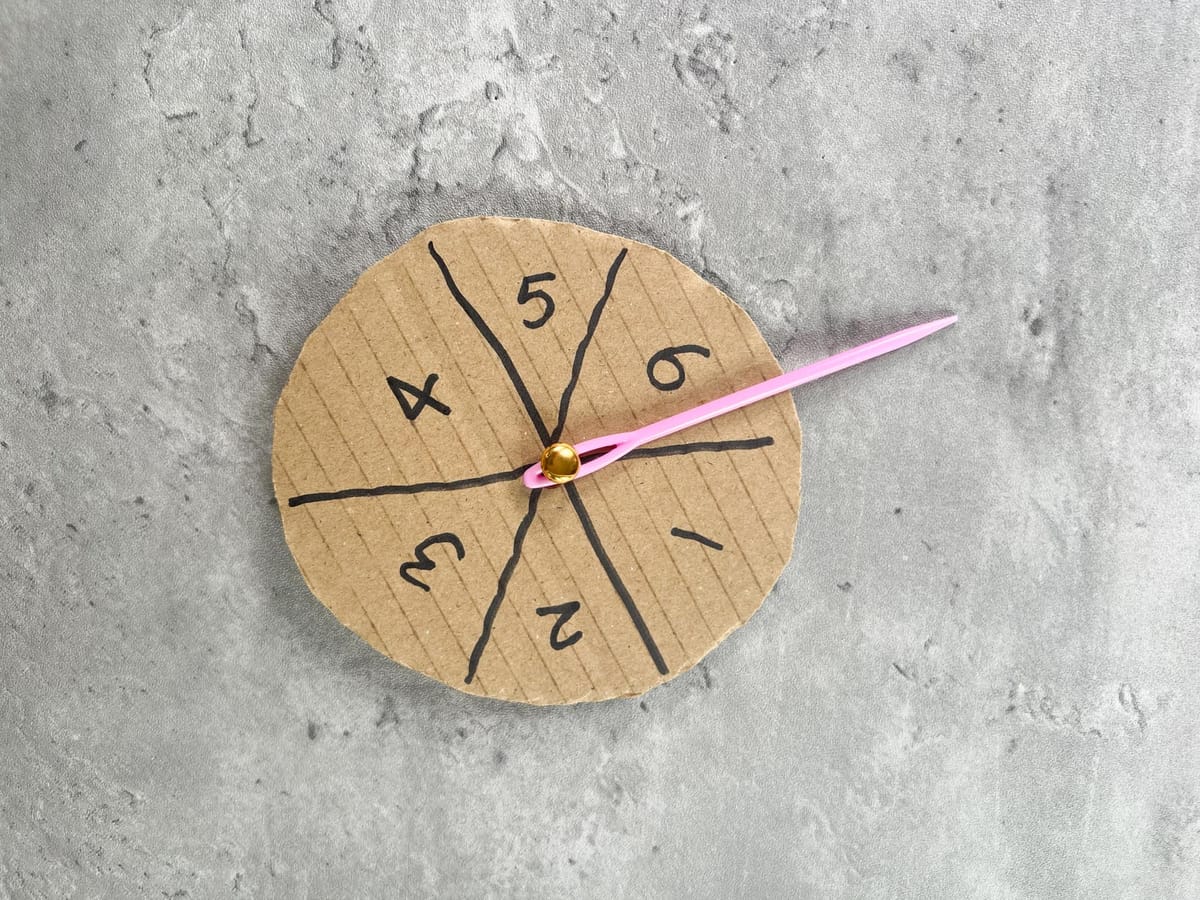
Do you ever notice how some of the simplest games captivate your child's attention? Think about it - why does a child squeal with delight when they roll a six on a board game? Why does "Rock, Paper, Scissors" never seem to grow old?
The answer lies in one powerful element: chance.
Chance transforms predictable play into an adventure. It levels the playing field between different ages and abilities. It creates those magical moments of surprise that light up your child's face.
The beauty of chance-based play is that it requires no special toys or elaborate setups. With just a few household items, you can introduce an element of unpredictability that breathes new life into familiar activities.
Inspiration from a pocket full of possibilities
This approach was inspired by my own son's brilliant intuition about play. Once, on a long, potentially-boring day trip, he produced the following items from his pocket:
A sand timer, a marble and a die.
My hero. We played games all day.
Three seemingly-unrelated objects. Thousands of possibilities.
What games could you play? Here are a few:
- Time races
- Play games of chance
- Roll the die to determine how many attempts you get to flick the marble at the target
- Time how long it takes you to get to the top of the hill and back
- Pretend the marble is the hidden treasure
- Try to roll a six before the timer runs out
- Try to roll a '4' and a '2' consecutively. That's the code for the secret door
No toys. Just a whole day's fun.
Creativity is a muscle. It grows with practice. And we don't always feel at our imaginative best. Sometimes we need a helping hand.
That's where these simple elements of chance come in - they're the spark that ignites creative play.
Six simple ways to add chance to any activity
Here are six easy ways to introduce unpredictability to your Play Kits or everyday activities:
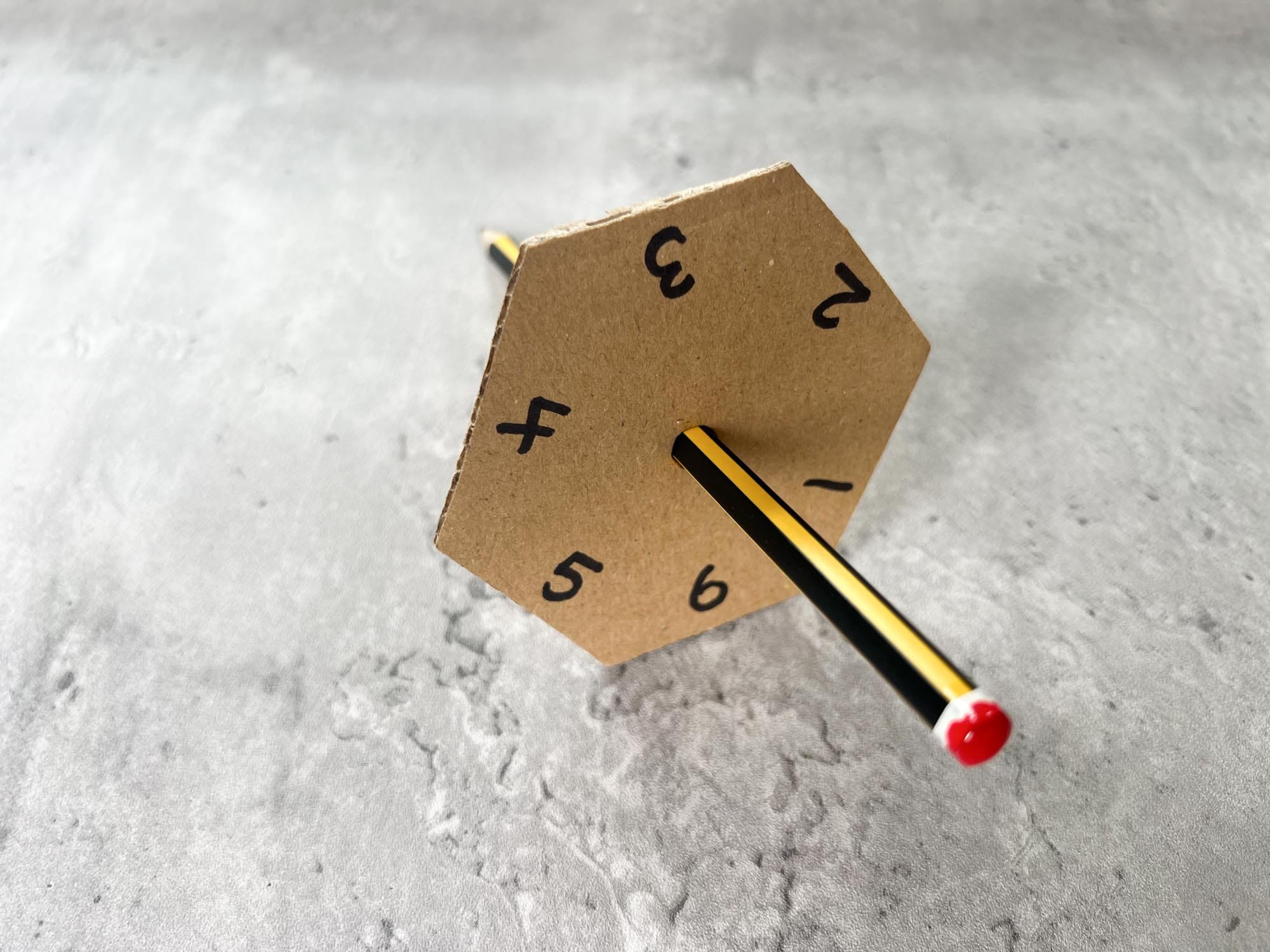
1. Pencil spinner (flat spinning top)
- Cut a hexagon (or octagon for more variety) from sturdy cardboard.
- Write numbers, colours, or actions along the edges.
- Pierce the centre with a pencil or skewer and spin it.
- The edge that touches the table when it stops is the result!
Why it works. It's a DIY alternative to dice and adds a fun visual element to randomness.
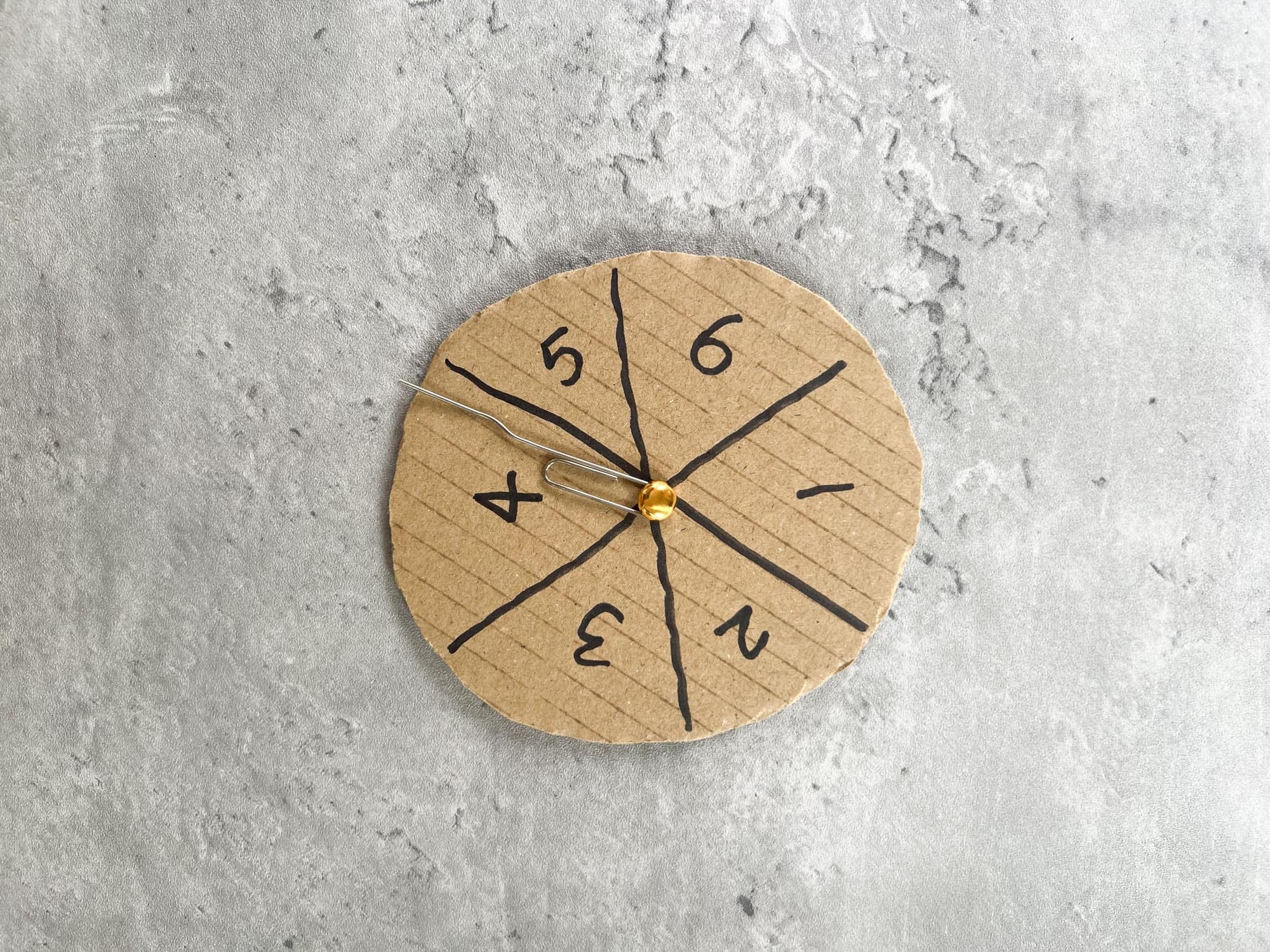
2. Paperclip spinner
- Unfold a paperclip slightly and place the tip of a pencil in the centre (or, for a more permanent construction, use a split pin).
- Flick the paperclip to make it spin.
- Divide a piece of paper or cardboard into sections. You can use numbers but the beauty of spinners is that you can use anything you want: colours, actions, dares.
- Wherever the paperclip lands decides the next action.
Why it works. Super easy and customisable – your child can design her own game boards.
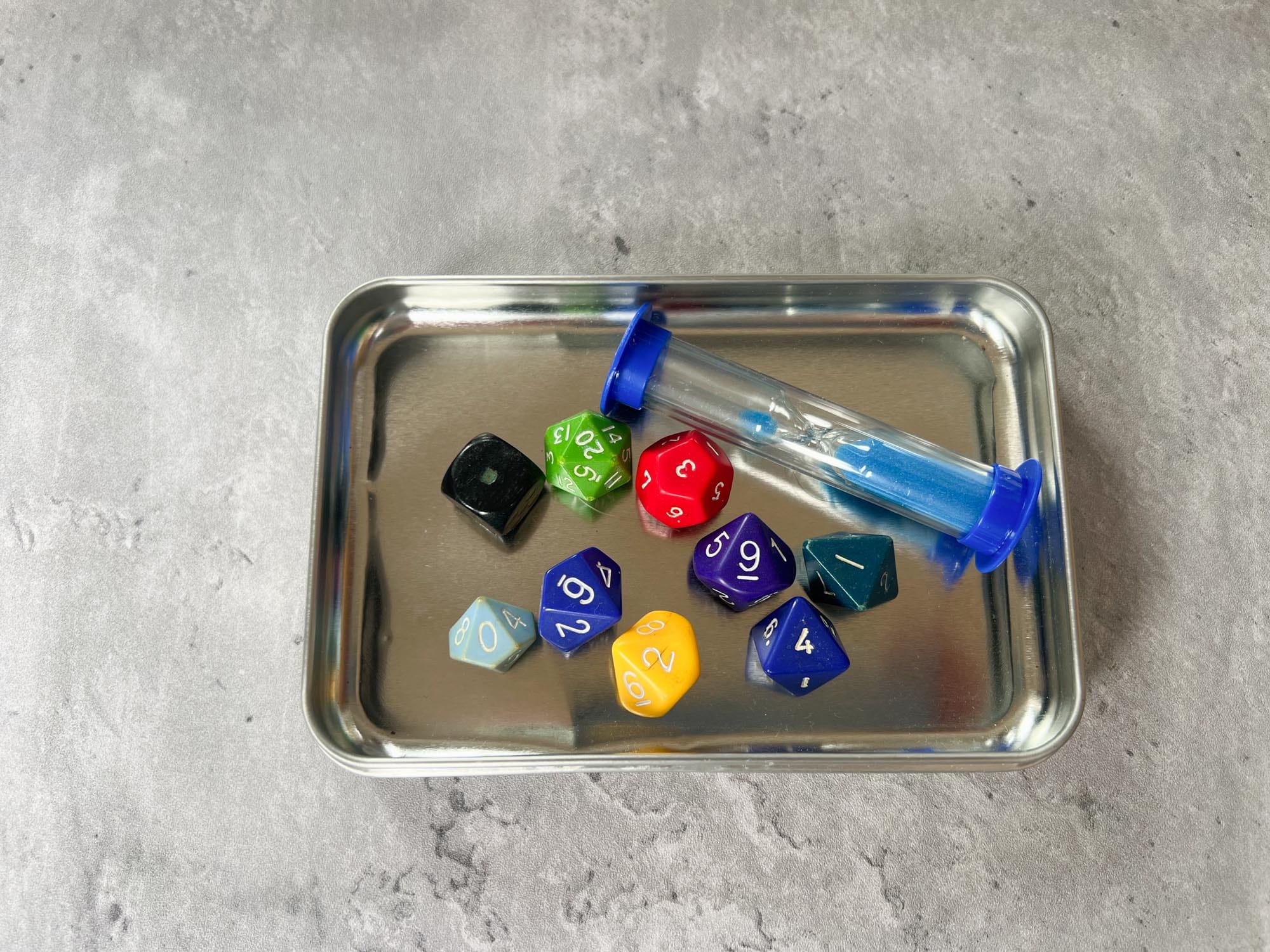
3. Dice variations
From the days before I had a girlfriend when - or probably because! - I used to play Dungeons & Dragons… But it wasn’t all bad - the many-sided dice used in the game add all kinds of excitement to your games.
- Two dice together. Add numbers, subtract, or pick the higher or lower roll.
- Odd vs. even. Roll a die and assign different actions to even or odd results.
- Multi-sided dice. D&D aficionados will know the fun you can have with 4-, 6-, 8-, 10-, 12- and even 20-sided dice! Who needs a girlfriend when you can have so much fun working out the probability of killing a goblin with a +5 magical broadsword? 😎💪
Why it works. Dice create instant suspense.
4. Feely bag (mystery draw)
- Fill a small bag with different objects (e.g. buttons, coins, small toys).
- Without looking, your child draws an object.
- Each object corresponds to an action or outcome (e.g. "A red button means take two turns").
Why it works. The tactile element adds surprise and sensory engagement.
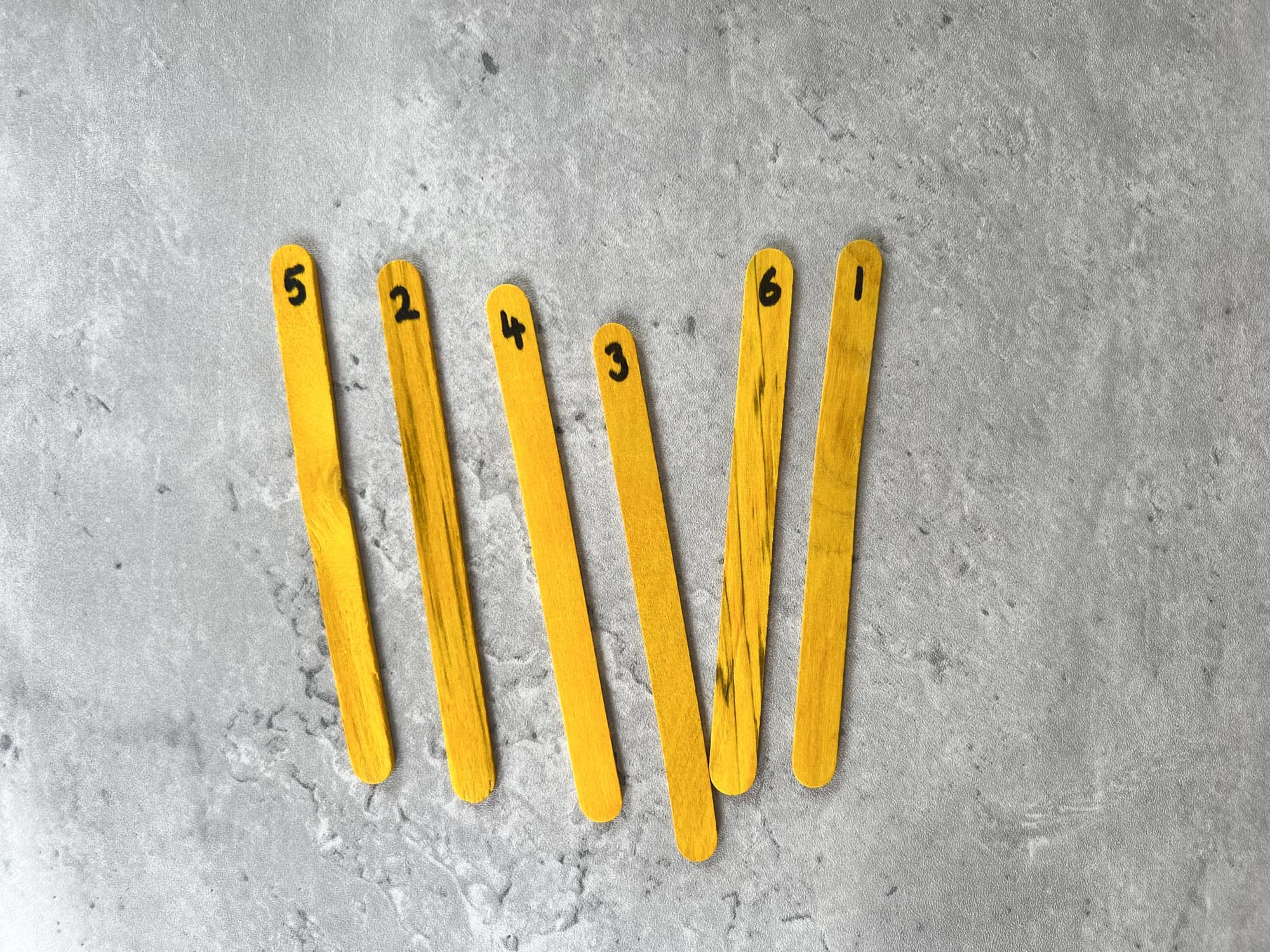
5. Pick-a-stick (random draw game)
- Write different actions or numbers on lolly sticks.
- Put them in a cup or bag - or simply hold the sticks in your hand, making sure to cover the markings.
- Draw a stick and discover your fate. Like the spinner, you can mark these with anything, so get creative.
Why it works. The physical act of drawing a stick creates a fun 'lucky dip' effect.
6. Fortune teller (paper flip game)
- Fold a paper fortune teller.
- Label the flaps with different actions, numbers, or choices.
- Children take turns playing the teller to reveal their fate.
Why it works. It's a classic playground favourite with endless customisation options.
Bonus: Coins
Don’t forget the OG of games of chance - the coin flip. And don’t stop there. Think of all the games you can play with a coin: Shuffleboard and pitching pennies, for example. Or simply seeing who can spin it for the longest - and guessing which side will face upwards when it drops.
Why chance transforms ordinary play into extraordinary adventures
When you add an element of chance to play, something remarkable happens. Your child doesn't just engage with the activity - they connect with the experience emotionally.
This happens because chance creates:
Emotional investment. Will the dice roll in her favour? What will she draw from the bag? This uncertainty creates natural suspense and excitement.
Equal opportunities. Chance levels the playing field between siblings of different ages or between you and your child. When luck plays a role, anyone can win.
Resilience building. Sometimes the spinner lands on the challenging option. Learning to accept and adapt to random outcomes builds emotional flexibility.
Decision-making practice. When outcomes aren't predetermined, your child must think on her feet and respond to changing circumstances.
Best of all, adding chance to play requires almost no preparation. Keep a die, a spinner, or a set of marked sticks in your Play Kits, and you instantly have the power to transform any activity from ordinary to extraordinary.
The pocket Play Kit concept
This is exactly why I love the concept of pocket Play Kits - small collections of seemingly random objects that can be combined in countless ways. Like my son's impromptu kit of a die, marble and timer, these minimal collections spark maximum creativity.
Consider creating your own pocket Play Kit with just 3-5 small items that include at least one element of chance. Some combinations to try:
- A die, a small ball, and a stopwatch
- A spinner, a few figurines, and a pencil
- A deck of cards, some counters, and a timer
Keep these in a small pouch ready for restaurants, waiting rooms, or long journeys. They take up almost no space but expand into infinite play possibilities.
So the next time play feels a bit too predictable or your child seems on the verge of boredom, remember: a simple roll, spin, or draw might be all you need to reignite the magic of play.
What chance-based element will you add to your child's next play session?
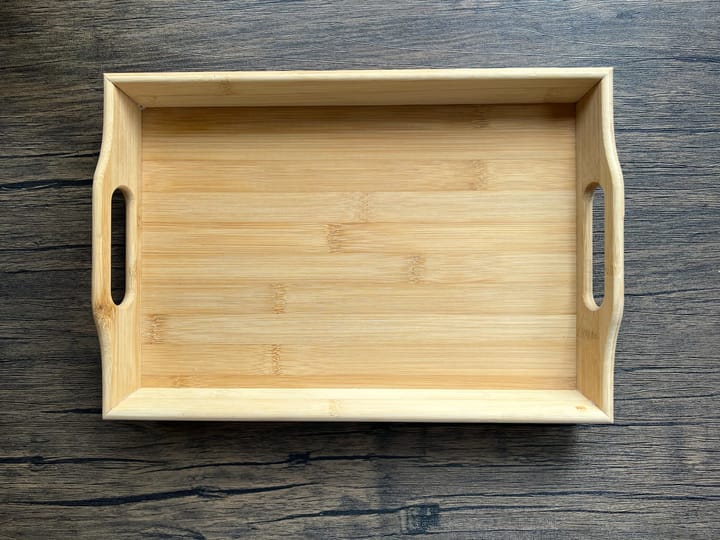

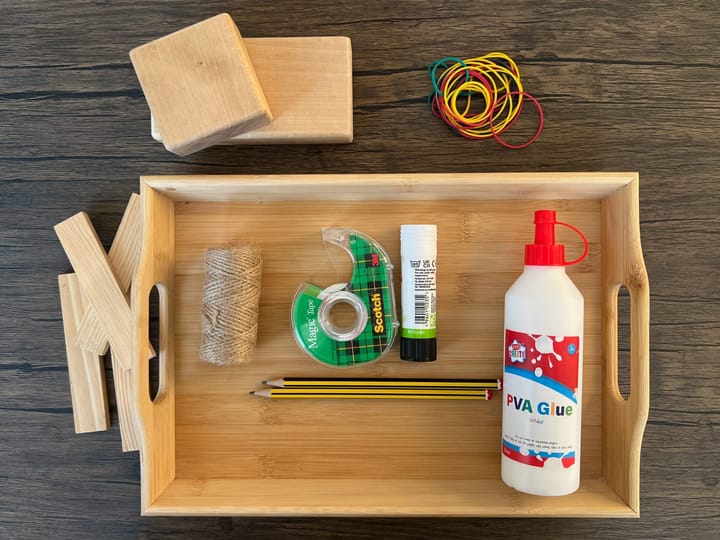
Comments ()